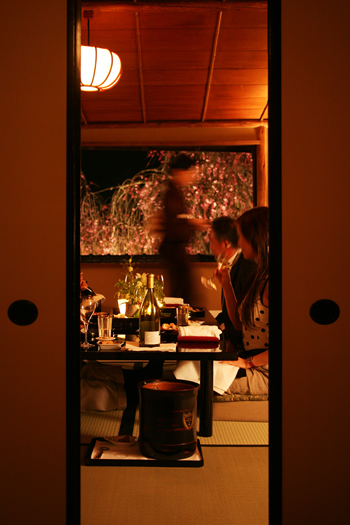Gion

Time Out's in-depth guide to Gion.
This section is brought to you in association with All Nippon Airways

Posted: Mon Jun 27 2011
I recently received a number of enquires asking: ‘what exactly is a Japanese tea house?’ So allow me to go over a few tea house fundamentals.
Simply put, a tea house is a kind of concierge service for clients who hold an account there. The role of the tea house is to take care of all entertainment needs, from dining to discussion, that a client may require.
As an example, a client might contact the tea house to say that he’ll be visiting and would like them to take care of him. It would then be the tea house’s responsibility to arrange for a car to go and collect the client from wherever he may be arriving, look after the his restaurant reservations (often choosing from the menu on the client’s behalf), and arrange for anything else that he may desire, such as musical performance or the company of a young Japanese dancing girl. Additionally, the tea house may also arrange for the client to attend a second establishment during the course of the evening, often going as far as choosing the brand of alcohol that the client will be served there, arranging a car to collect him at the end of the evening and, if necessary, making special arrangements for him to stay at a particularly exclusive hotel for the night.
If the client wishes to go to the theatre, the tea house will arrange the tickets. If the client wishes to take a boat out for a spot of moon-viewing, then the tea house will arrange the boatman. In short, the tea house will take care of everything, as and when it is required.
Building the kind of relationship that’s necessary to have a tea house bestow this level of service can be extremely difficult. First off, in order to set up an account, you need an introduction. Furthermore, the level of service you can expect to receive will depend on whose you received. Things are inevitably changing, but traditionally, the person who introduces you must take responsibility for your conduct. If a client were to make the mistake of introducing someone who turned out to be a troublemaker, for example, then they themselves would lose the privilege of calling upon the services of that particular tea house.
I often hear of would-be-customers who, although they may have accompanied an established client to a tea house once before, find themselves unable to make a reservation in their own name. Usually, such people have little or no idea of what you might call ‘Kyoto chic’.
Another common misunderstanding involves what it means to have an account with a tea house. Such an account gives the account-holder the privilege of having the tea house pay for things on the client’s behalf, which is a convenient service indeed. Account-holding clients can have the tea house pay their restaurant bills, their drinks expenses and even the cost of any souvenirs or gifts they may desire during there stay. There should really be no need for the client to worry about his wallet during a stay in the hanamachi.
All of this explains why establishing an account with a tea house can be so very difficult, and it requires an almost familial level of trust for it to work successfully. Needless to say, merely receiving a bill from a tea house at which you’ve recently attended a drinking party does not equate having an account with them.
The original version of this article, in Japanese, appeared
in ANA's inflight magazine, Tsubasa no Oukoku.
Tags:
- About Us |
- Work for Time Out |
- Send us info |
- Advertising |
- Mobile edition |
- Terms & Conditions |
- Privacy policy |
- Contact Us
Copyright © 2014 Time Out Tokyo


Add your comment